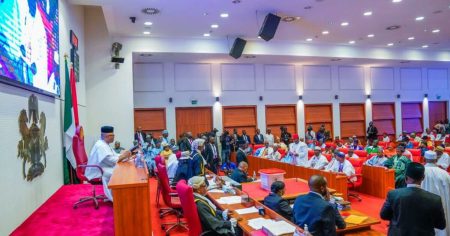The World Bank, in its bi-annual Global Economic Prospects report, maintains its 3.6% growth projection for the Nigerian economy in 2025, a figure consistent with its earlier forecast. This projection comes despite a global economic slowdown and reduced growth forecasts for nearly 70% of global economies, including major players like the United States, China, and European nations. The Bank attributes this global slowdown to escalating trade tensions and heightened uncertainty, stemming in part from recent trade policy shifts. Despite these global headwinds, the World Bank believes Nigeria, along with much of Sub-Saharan Africa, will remain relatively insulated from the direct impacts of these trade disputes due to limited direct export exposure to the US and China outside of commodity markets.
The World Bank’s optimistic outlook for Nigeria hinges on several factors. Primarily, it anticipates the continued implementation of domestic reforms that have already stimulated investment and spurred growth, particularly within the services sector. Financial services and information and communication technology are expected to be key drivers of this growth. Furthermore, the Bank projects a gradual decline in inflation following the 2024 monetary policy tightening aimed at stabilizing the Nigerian currency. While acknowledging the constraints on the industrial sector due to subdued crude oil production, the report emphasizes the resilience of the services sector as the primary engine of economic expansion.
However, the report also highlights significant challenges and vulnerabilities facing Nigeria and the broader Sub-Saharan African region. While the direct impact of trade tensions might be minimal, the indirect effects, such as a potential slowdown in the Chinese economy and the consequent reduction in demand for commodities, pose a significant risk. Many Sub-Saharan African countries heavily rely on commodity exports, and a decline in commodity prices could lead to diminished economic activity and further strain already limited fiscal resources. This vulnerability underscores the region’s dependence on global commodity markets and the need for diversification to mitigate future risks.
Beyond trade-related concerns, the World Bank identifies several other critical challenges. Persistent violence in the region continues to disrupt economic activity, hindering development and investment. While public debt-to-GDP ratios are expected to gradually decline, high debt servicing costs limit governments’ ability to invest in crucial development programs. Furthermore, potential reductions in official development assistance inflows could exacerbate humanitarian and fiscal challenges. The increasing frequency of extreme weather events, which damage crops and depress economic activity, adds another layer of complexity to the region’s development prospects.
The World Bank projects an average annual per capita income growth of 1.6% for Nigeria and Sub-Saharan Africa between 2025 and 2027. However, this growth rate is still insufficient to significantly reduce extreme poverty, a persistent challenge in the region. The report underscores the uneven distribution of this growth, with some countries, particularly those affected by conflict, experiencing declining per capita incomes. The projected slow recovery underscores the deep-seated structural issues and the need for targeted interventions to address poverty and inequality.
The World Bank report also points to a significant demographic shift: a rapidly expanding working-age population in Sub-Saharan Africa. While this demographic trend could potentially fuel economic growth, the report cautions that without policies to stimulate growth and address long-standing structural bottlenecks, these economies will struggle to create the necessary jobs to absorb this expanding workforce. This looming “jobs challenge” underscores the urgency of implementing reforms to promote inclusive growth, improve education and skills development, and create a conducive environment for private sector job creation. Failure to address this challenge could lead to increased unemployment, social unrest, and further exacerbate existing inequalities.














